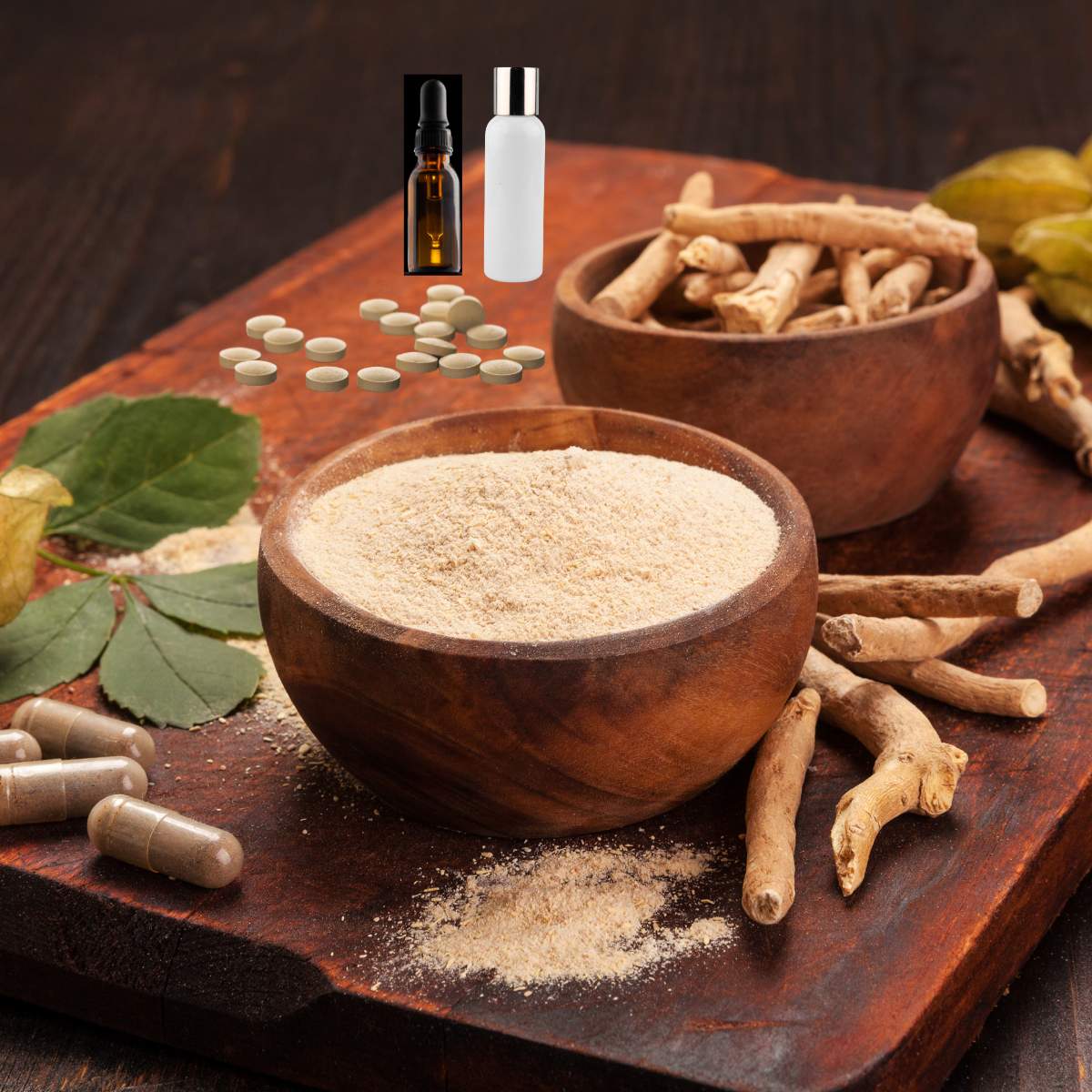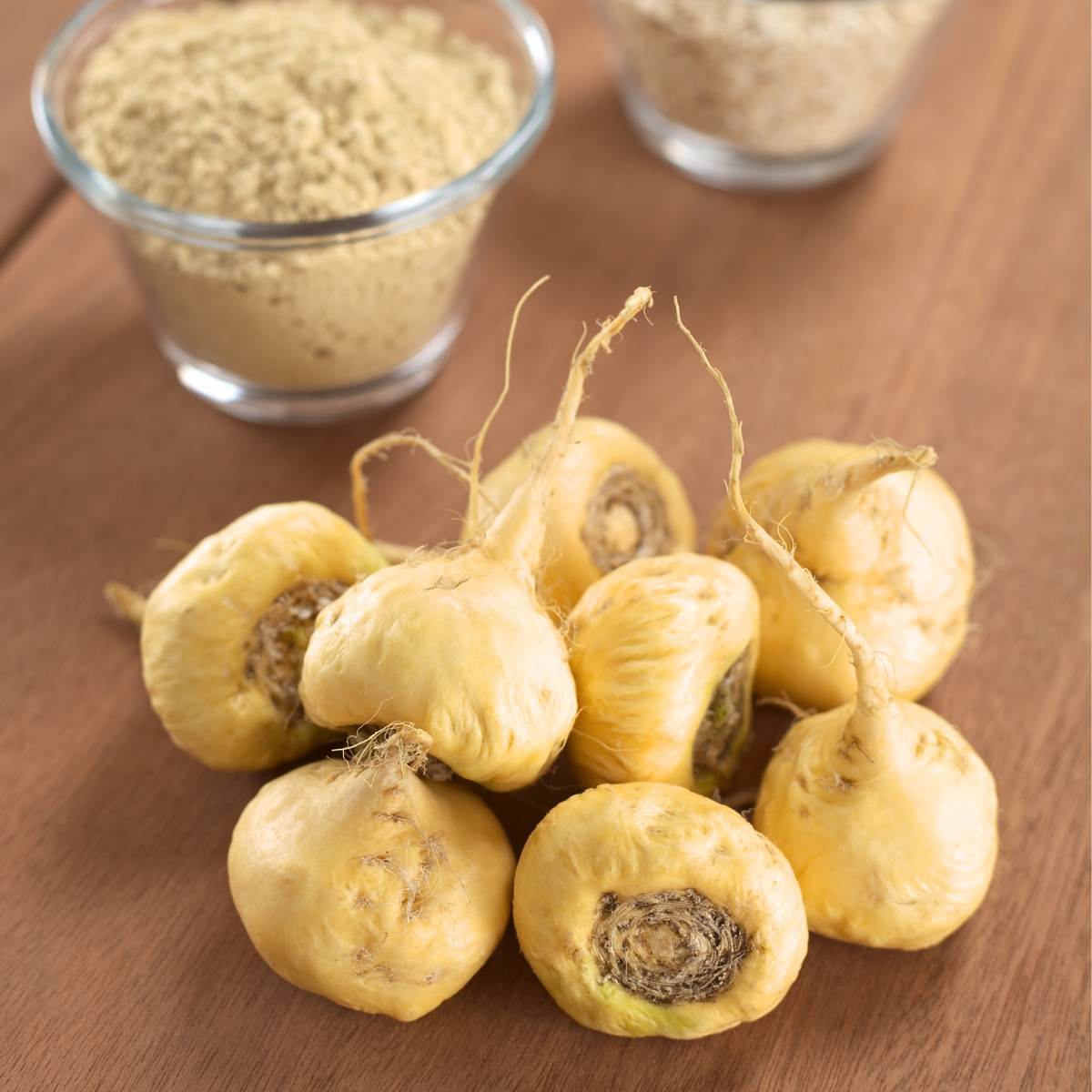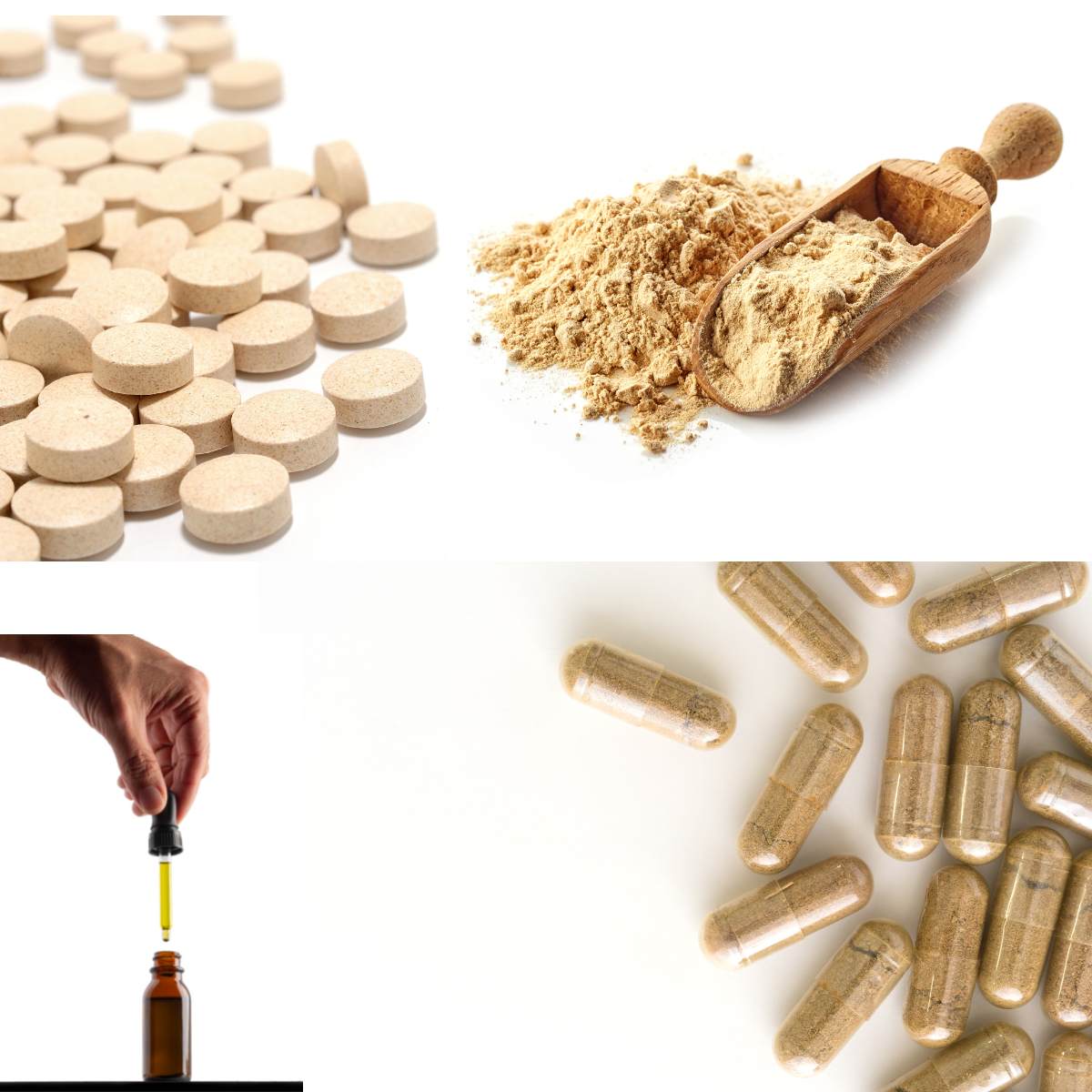Wondering about when and how to use maca root vs ashwagandha? You're in the right place! Both are herbal supplements that have been traditionally used for medicinal purposes. Maca is often referred as "Peruvian ginseng" and commonly used as a natural remedy for sexual dysfunction and to boost energy levels. Ashwagandha is often used as a natural remedy for stress, anxiety, and insomnia. Read more about their similarities, differences, and uses below.
What is Ashwagandha?

Ashwagandha is an adaptogenic herb that is native to India and is commonly used in Ayurvedic medicine. It is also known as Indian ginseng or winter cherry. Ashwagandha is a small shrub with yellow flowers and red fruit, the root, and berry of the plant are used for medicinal purposes.
Benefits of Ashwagandha
Ashwagandha is commonly used for a variety of purposes, including:
- Reducing Stress and Anxiety: Ashwagandha is believed to help reduce cortisol levels, a stress hormone, in the body. This may help to reduce feelings of stress and anxiety and contribute to better mental health.
- Improving Sleep: Ashwagandha may also help to improve sleep quality and reduce insomnia.
- Boosting the Immune System: Ashwagandha is thought to have immune-boosting properties, which may help to protect the body against infection and disease.
- Improving Cognitive Function and Memory: Some research suggests that ashwagandha may help to improve cognitive function and memory, particularly in older adults.
- Enhancing Physical Performance: Ashwagandha may also help to improve endurance and physical performance, making it a popular supplement among athletes and fitness enthusiasts. Check out this ashwagandha study for more info.
- Improving Fertility: Ashwagandha may also be used to improve fertility in men and women.
- Anti-Inflammatory and Anti-Cancer Properties: Ashwagandha may also have anti-inflammatory properties and may be able to reduce the risk of certain types of cancer.
- Reducing Menopausal Symptoms- One way ashwagandha alleviates menopause symptoms like hot flushes and mood swings is by increasing FSH, estradiol, and lutenizing hormone.
Various Forms of Ashwagandha

Ashwagandha is commonly available in several forms, including:
- Powder: Ashwagandha powder is made by drying and grounding the root of the ashwagandha plant. It can be added to smoothies, juices, or mixed into other foods. It can also be used to make tea.
- Capsules: Ashwagandha supplements are also available in capsule form, which is easy to take and convenient to use.
- Tablets: Some supplements companies also make ashwagandha tablets, which are similar to capsules but in tablet form.
- Liquid Extract: Ashwagandha extract is available in a liquid form, which is more potent than powder form and can be added to drinks or taken directly.
- Tincture: Ashwagandha tinctures are also available which are liquid extract of ashwagandha in alcohol or another liquid base.
- Creams and Lotions: Ashwagandha is also available in creams and lotions for topical use.
It's important to note that the effectiveness of ashwagandha supplements can vary depending on the form you choose, as well as the quality and purity
What is Maca?

Maca is a root vegetable that is native to the Andes Mountains in Peru. It is a member of the cruciferous family, which also includes broccoli, cauliflower, and kale. Maca is rich in antioxidants, amino acids, and minerals. It is also said to have anti-inflammatory properties.
Benefits of Maca
Maca is commonly used for a variety of purposes, including:
- Boosting Energy Levels: Maca is believed to have energizing properties and may help to increase energy and endurance.
- Improving Sex Drive: Maca is also commonly used as a natural supplement for sexual health as it may improve sexual function and libido, particularly in men.
- Hormone Production and Regulation: Maca is also said to help balance hormone levels in both men and women. It does this in part by stimulating the pituitary gland and hypothalamus which handle hormone regulation.
- Improving Fertility: Maca has been traditionally used to improve fertility in men and women and is sometimes called "Peruvian ginseng" for this reason.
- Improving Bone Health: Maca is rich in minerals, particularly in calcium and magnesium, which are essential for healthy bones.
- Antioxidant Properties: Maca is rich in antioxidants, which may help to protect the body against damage from free radicals and reduce the risk of chronic diseases.
- Anti-Inflammatory Properties: Maca is said to have anti-inflammatory properties, which may help to reduce inflammation and pain in the body.
- Increasing Muscle Mass- Clinical studies have shown that maca promotes muscle growth by triggering certain cell signaling pathways.
Various Forms of Maca

Maca is commonly available in several forms, including:
- Powder/Flour: Maca powder is made by drying and grounding the root of the maca plant. It can be added to smoothies, juices, or mixed into other foods. It can also be used to make tea.
- Capsules: Maca supplements are also available in capsule form, which is easy to take and convenient to use.
- Tablets: Some supplement companies also make maca tablets, which are similar to capsules but in a tablet form.
- Liquid Extract: Maca extract is available in a liquid form, which is more potent than the powder form and can be added to drinks or taken directly.
It's important to note that the effectiveness of maca supplements can vary depending on the form you choose, as well as the quality and purity of the product.
Can You Take Maca and Ashwagandha Together?
Both maca and ashwagandha are considered safe to consume, and there is no evidence to suggest that taking them together would cause any harmful interactions. In fact, many supplements that are marketed for energy and vitality, stress relief, and sexual function contain a combination of both maca and ashwagandha.
Possible Side Effects and Interactions
Ashwagandha:
Ashwagandha is generally considered safe when used in the recommended dosages. However, some possible side effects and interactions have been reported with the use of ashwagandha. These include:
- Stomach Upset: Ashwagandha supplements may cause stomach upset, nausea, or diarrhea when taken in high doses.
- Drowsiness: Ashwagandha may cause drowsiness, so it is not recommended to take it before driving or operating heavy machinery.
- Interactions with Medications: Ashwagandha may interact with certain medications, particularly sedatives, blood thinners, and thyroid hormone replacement therapy. It is important to consult with your healthcare provider before taking ashwagandha if you are taking any medications.
- Hormone-Sensitive Conditions: Ashwagandha may affect hormone levels, so it should be used with caution in people with hormone-sensitive conditions such as breast or ovarian cancer, endometriosis, or uterine fibroids.
- Pregnancy and Lactation: Ashwagandha should be avoided during pregnancy and lactation, as there is not enough information to determine its safety in these situations.
- Thyroid Function: Ashwagandha may affect thyroid function, and it should be used with caution in people with hypothyroidism (an underactive thyroid).
- Adrenal Fatigue- In some cases, Ashwagandha may suppress the function of the adrenal glands. Read the study from Toxicology and Environmental Health Sciences.
Maca:
Maca is generally considered safe when used in the recommended dosages. However, some possible side effects and interactions have been reported with the use of maca. These include:
- Stomach Upset: Maca supplements may cause stomach upset, nausea, or diarrhea when taken in high doses.
- Hormonal Effects: Maca may affect hormone levels, so it should be used with caution in people with hormone-sensitive conditions such as breast or ovarian cancer, endometriosis, or uterine fibroids.
- Interactions with Medications: Maca may interact with certain medications, particularly hormone replacement therapy and birth control pills. It is important to consult with your healthcare provider before taking maca if you are taking any medications.
- Pregnancy and Lactation: Maca should be avoided during pregnancy and lactation, as there is not enough information to determine its safety in these situations.
- Thyroid Function: Maca may affect thyroid function, and it should be used with caution in people with hypothyroidism (an underactive thyroid)
- Allergies: Some people may have an allergic reaction to maca, such as itching, hives, and difficulty breathing.
It's important to note that these side effects and interactions have been reported in isolated cases and may not apply to everyone. Also, always make sure to read the label, and consult with a healthcare professional before taking any supplement.
Maca and Ashwagandha Similarities
Ashwagandha and maca are both adaptogenic herbs, which means they help the body adapt to stressors.
They are also both considered to be aphrodisiacs, and they both have a long history of use in traditional medicine.
Additionally, both herbs have been traditionally used to enhance energy and vitality, boost the immune system, and improve overall health and well-being.
Differences Between Maca and Ashwagandha
Ashwagandha and maca are different plants that come from different regions.
Ashwagandha is native to India, Pakistan, and Sri Lanka, and has been used in Ayurvedic medicine for centuries.
Maca, on the other hand, is native to the Andean mountains of Peru and has been used for centuries by the indigenous people of the region.
They also have different chemical compounds and different traditional uses.
Ashwagandha is used to reduce stress and anxiety, increase energy and endurance, and improve memory and concentration.
Maca, on the other hand, is used to enhance fertility and libido, improve hormone balance, and increase physical and mental energy.
They also have different taste and texture.
Ashwagandha root is usually used in powder or capsule form whereas maca root is a root vegetable and can be consumed cooked or in powder form.
Conclusion:
I hope you enjoyed this post. It is important to note that although maca and ashwagandha have been used in traditional medicine for centuries, more research is needed to confirm their effectiveness and safety as a treatment for various conditions. I am not a doctor and this information is not to be taken as medical advice. It is always best to read labels and consult with a healthcare professional before taking any supplement, especially if you have any preexisting medical conditions or are taking any medications. They will be able to advise you on the best form for you to take.
If you enjoyed this post, you may also like:
B Complex vs B12 Injections: Comparison, Uses, and Precautions
Health Benefits of Sea Moss, Bladderwrack, and Burdock Root
Gut Health and Hashimoto's: What You Need to Know
24 Common and Not so Common Hashimoto's Flare Symptoms


Leave a Reply